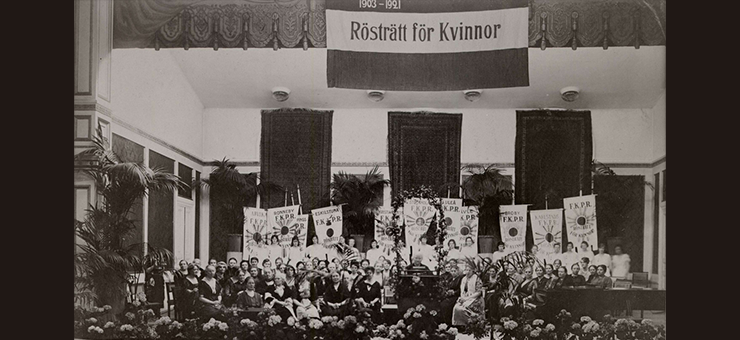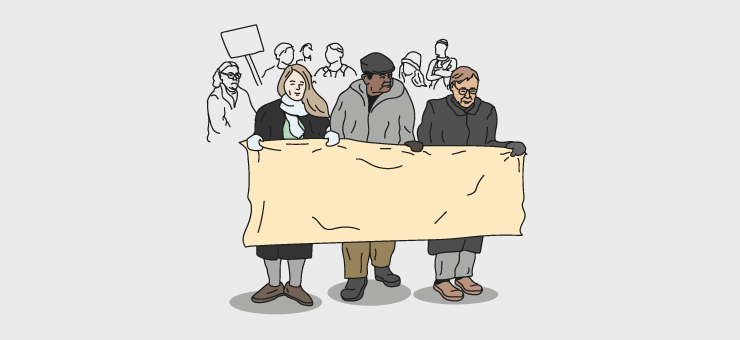What is democracy?
Last updated: 2/2-2023
What is democracy? That’s a difficult question which has no single answer. For some people, democracy is taken as a given, for others it is not. Sweden is a democracy, but it has not always been that way. A hundred years ago, many people in Sweden did not have many of the freedoms, rights and opportunities we have today.

Photo: Nordiska museet
This text is about democracy. It describes what characterises a democracy, as well as different types of democracy. It also talks about challenges to democracy in Sweden and explains various things you can do in order to have an influence and participate in society.
Everyone has the right to participate in the governing of their country, either directly or by electing their representatives in free and fair elections.
You are also entitled to freedom of opinion and expression. This means that you are free to have the views and think the thoughts you wish. You can also spread your ideas and thoughts to others, such as via social media. But you are not allowed to use your freedom of expression to spread hate and slander about other people and groups. You also have the right to organise and take part in peaceful gatherings, protest marches and associations. But you are also entitled not to participate in gatherings or protest marches, and not to be a member of any association.
What characterises a democracy?
Democracy is a way of organising society. The word "democracy" comes from Greek and is usually defined as "government by the people". What this means is that the political power in democracies ultimately lies with the people. The opposite of democracy is dictatorship, in which a single party or person makes all the decisions.
Sweden is a democracy. The Swedish constitution (grundlag) states that all public power in Sweden proceeds from the people. This means that the people decide who should govern the country. The people choose which parties and politicians should govern the country on their behalf.
People have been discussing democracy for several thousand years. It is difficult to describe democracy in a way that everyone can agree on. Most people agree that it is about letting people participate in making decisions. It is also about the division of power between the state, the population and the politicians, and about ensuring that this division is done in a fair, equal and legal way.
Below are some examples of what characterises a democracy.
The people elect the government in free and fair elections
Free and fair elections are fundamental to a democracy. What this means is that all adults, both men and women, must be able to vote in parliamentary elections. The vote is secret, meaning that voters do not have to tell anyone how they voted.
The majority usually decides
In a democracy the decisions are usually by majority. This means that the proposal which gets the most votes when a vote is held is the one that is adopted. A single person may not decide something unless more people agree. But the majority may not make decisions that breach the constitution or human rights.
The majority must never oppress minorities in a country. Minorities are groups of people in a society that have fewer members than the majority.
All humans are of equal worth
All humans are of equal worth and must have equal rights in a democracy. No one must be treated unfairly. You have to have the same rights, opportunities and obligations regardless of who you are.
The people have political rights and freedoms
In order for democracy to function, it is important that everyone is allowed to hold the opinions they want and to state them. This is known as freedom of opinion. Everyone must also be able to express their opinions, for example, in newspapers, on the radio or on television. This is known as freedom of expression and freedom of the press. However, you may not use your freedom of expression to incite hatred of other people or groups or spread slander against them. People must also be allowed to meet in groups and demonstrate against things they think are not working in society. This is known as freedom of assembly.
Freedom of opinion, of expression, of the press and of assembly are examples of political rights and freedoms. These right and freedoms are usually written into a country's constitution.
Everyone is equal before the law
Another important characteristic of democracy is that everyone is equal before the law. It does not matter if you are rich or poor, man or woman, if you were born in Sweden or in another country. Everyone has to comply with the laws that exist. If you have committed a crime or are accused of a crime, you are entitled to have it investigated. No person may be convicted without a fair trial.
There are different types of democracy
There are different types of democracy. Different democratic countries have chosen different ways of having the people govern. For example, a country can have a representative democracy. This means that the people choose representatives – parties or politicians – to govern the country for them. Sweden is a representative democracy. Everyone who is entitled to vote casts their vote for parties that can win seats in the Riksdag (the national parliament), the regional and municipal assemblies, and the European Parliament.
There are also countries that have elements of direct democracy. Direct democracy means that everyone who is entitled to vote participates in making decisions. One example of direct democracy is referendums in which the people are asked to participate in making a decision or stating their opinion on a particular issue.
Challenges to Swedish democracy
Democracy in Sweden is strong in comparison with that in many other countries. A large proportion of the Swedish population, both men and women, votes in Swedish elections. In Sweden, everyone is entitled to make their voice heard and to state their opinion. Most people in Sweden trust the authorities, the government, and each other. But there are also challenges to Swedish democracy.
One challenge is that voter turnout – the number of people who vote in elections – varies a lot between different groups in society. Voter turnout is lower among people with a low level of education, for example.
Another challenge is that propaganda, lies and hate are sometimes spread on social media. Politicians, journalists and other people who take part in the public debate are sometimes threatened. Women who state and write their opinion are sometimes subjected to hate, threats and sexual harassment because they are women. People may also be subjected to hate crimes and discrimination due to their religion, gender or skin colour, for example. If a person risks being subjected to hate, for example, they may not dare participate in democratic processes.
There are also groups who want to obstruct democracy and create distrust and division in society, for example, by setting different groups against each other or spreading incorrect information.
Democracy does not sustain itself. We have to look after it. This means it is important to do things like use your right to vote, to form an opinion on societal issues, and to follow the news and information from the authorities in order for democracy to be sustained and to develop.
What can you do to look after democracy now and in the future?
Everyday democracy
Example: Adam wants to have an influence in society
Adam has a residence permit and has lived in Gothenburg for four years. He has just voted in the municipal election in Gothenburg. He is thinking that it will now be four years until he can take part in influencing policy in Gothenburg again. Is it only on election day that Adam can influence and take part in democracy? Or are there other ways in which he can influence and take part?
Democracy is not just about voting in elections, and it is not only politicians who work with democracy. Democracy can be used in everyday contexts – in school, in the area where you live, in sports and in your workplace.
It is important for all of us who live in Sweden to continue to develop and safeguard our democracy. It is important that we also feel like participants in society and that we feel we can have an influence.
Do you have ideas regarding how your journey to and from work could be made safer? Do you think it is important to think about how things impact the environment? The list contains various suggestions for what you can do to take an active part in society and influence conditions in your everyday life. Your voice and your views are important.

Things you can do to influence and participate in the democratic process
- You can vote in elections
- You can become a member of a political party
- You can get in touch with a politician
- You can start or sign a petition
- You can join an organised protest, such as a demonstration
- You can join or start an association or an organisation
- You can contact the media to tell them about things you think are important
- You can contribute an opinion piece to a newspaper or write a letter to the editor
- You can post on social media to draw attention to an issue
- You can have an influence in your workplace, for example, through trade unions
- You can submit feedback or complaints to your municipality
- If you go to school, you can have an influence by telling your teacher or your pupils' council what you think
- You can have an influence in your neighbourhood
- You can participate in meetings arranged by your municipality
- You can submit a citizen's proposal to your municipality or region
Think about what you would like to change in society, or what you feel is important. Which of the options in the list above would you choose to advocate for, to express your views or your proposal?



